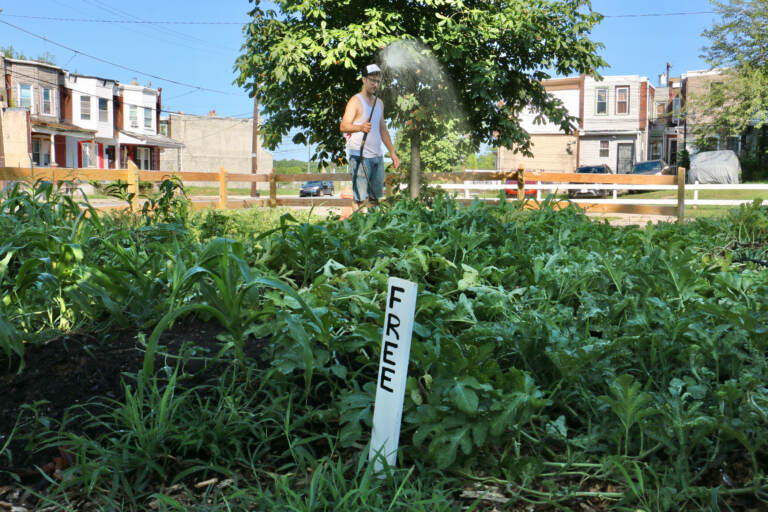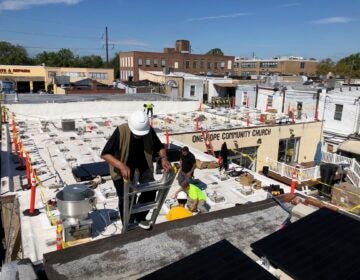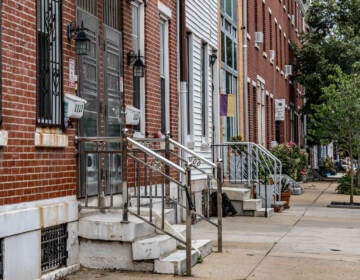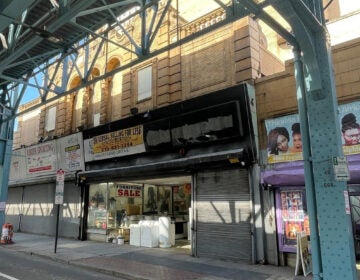Philadelphia Land Bank buys 35 garden lots, advancing land preservation plan
The lots were once tangled up with privately held tax liens. The Land Bank can now transfer them to gardeners and land trusts.
Listen 1:06
Farm manager Benjamin Miller waters the garden at 61st and Reinhard streets in Southwest Philadelphia. (Emma Lee/WHYY)
This story is part of the WHYY News Climate Desk, bringing you news and solutions for our changing region.
From the Poconos to the Jersey Shore to the mouth of the Delaware Bay, what do you want to know about climate change? What would you like us to cover? Get in touch.
When Stephen Drain was growing up in Southwest Philadelphia, the vacant lots between rowhouses on Reinhard Street attracted trash and debris.
Now, these lots grow sweet corn, watermelon, collard greens, jalapeños and chilis.
“Over the last five years, we’ve been able to develop the lots into a thriving food oasis that also has space for people to sit and reflect,” said Drain, farm director at the Reinhard Street Community Farm and Kitchen. The organization runs a community fridge and delivers free produce to neighbors.
But like many community gardens in Philadelphia, the Reinhard Street Community Farm and Kitchen does not own most of the abandoned land it operates on. The farm has struggled with the threat of land speculators or developers purchasing the land out from under it.
But the farm inched closer to securing the land in August, when the Philadelphia Land Bank purchased six of the more than two dozen lots that make up the farm at sheriff’s sale. The Reinhard Street Community Farm and Kitchen hopes to eventually buy these parcels from the Land Bank.
“We’re in a more secure position than we were when we first started growing,” Drain said.
Plan to secure 91 garden lots moves forward
The Reinhard Street plots are among 35 garden parcels once tangled up with privately held tax liens that the Land Bank bought at sheriff’s sale in August, said Land Bank spokesperson Karen Guss. The purchases are part of a multistep plan orchestrated by garden advocates and some City Council members to transfer abandoned land now used for agriculture to gardeners or nonprofit land trusts.
“We’re talking about community gardens that have been in the hands of community for 20-plus years, where neighbors have created a garden oasis in the middle of blight,” said at-large City Councilmember Kendra Brooks, one of the architects of the plan.
This latest step was years in the making. In 2023, the city bought back the tax liens on 91 garden parcels that had been sold off to a private lienholder in the 1990s. The buyback gave the city control over whether and when to bring the parcels to sheriff’s sale.
The next year, Council passed a law allowing the Land Bank to legally continue to take priority over other bidders at sheriff sale. The city could then move the garden parcels through the sheriff’s sale process without fear they’d be scooped up by third parties.
The next step is for the Land Bank to transfer the garden lots “into the hands of the community,” either to third-party land trusts or groups of gardeners organized as nonprofits, Brooks said. The Land Bank can transfer and sell the land at discounted prices to buyers who will use it for purposes like community gardens or affordable housing.
“The process is moving along,” Brooks said.
Gardeners are now ‘making plans for the future’
Among the Land Bank’s recent purchases was a lot on Leidy Avenue used by the Viola Street Community Garden in East Parkside, which was founded in the 1980s and is one of the city’s oldest community gardens.
Viola Street gardeners hope to prevent the lot from being developed, since it sits to the south of the main garden, and a tall building built there could block the sun, said gardener Mandy Katz. The rest of the garden land is owned by the nonprofit land trust Neighborhood Gardens Trust.
With the Leidy Avenue lot now in the city’s Land Bank, Katz said the gardeners are preparing to plant it with fruit trees including figs, cherries and elders.
“We’re making plans for the future like we never were able to in the past,” Katz said.
For the Reinhard Street Community Farm and Kitchen, more work lies ahead for the organization to preserve its land. Close to half of the garden’s parcels are still privately owned.
“We’ve made some progress, but more progress is necessary in order for us to be successful,” Drain said.

Get daily updates from WHYY News!
WHYY is your source for fact-based, in-depth journalism and information. As a nonprofit organization, we rely on financial support from readers like you. Please give today.








